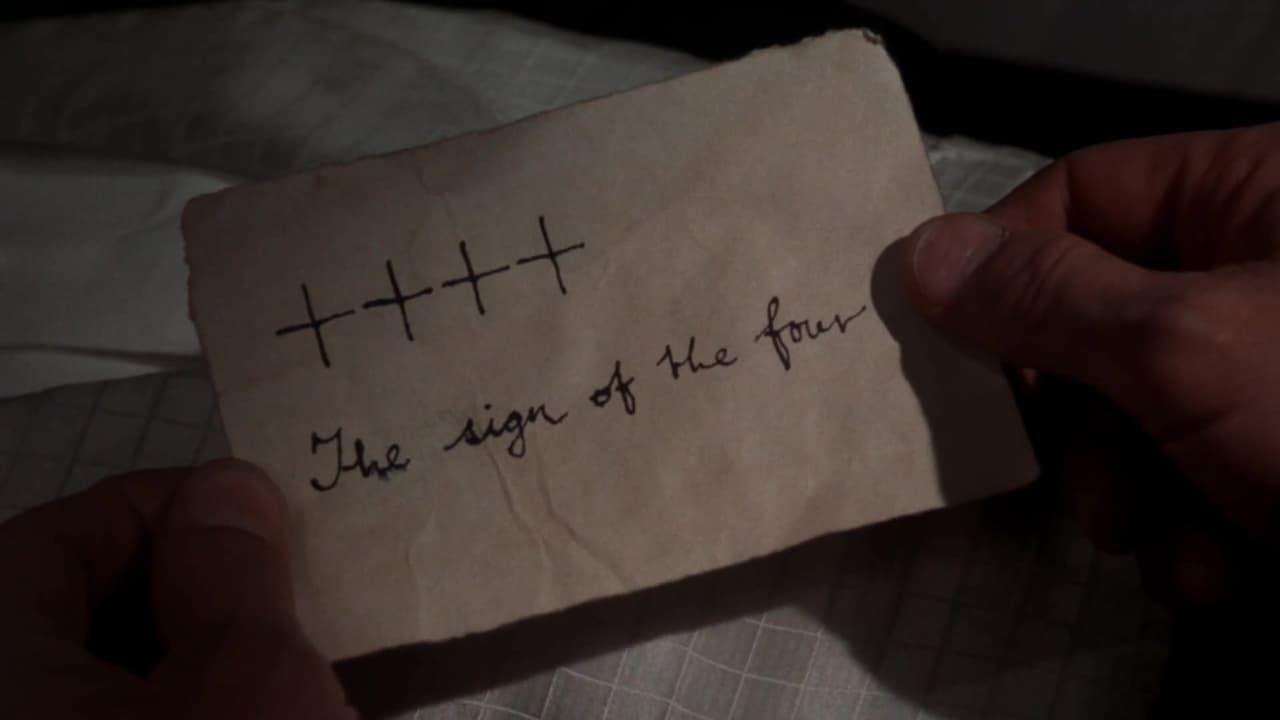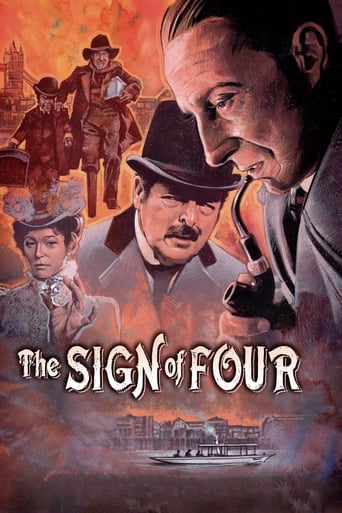

THE SIGN OF FOUR, a Holmes adaptation featuring Ian Richardson as Conan Doyle's sleuth, is a follow up to the slightly disappointing TV production of THE HOUND OF THE BASKERVILLES. THE SIGN OF FOUR is only slightly better, a perfectly atmospheric and well mounted production let down by a slightly stodgy script that's going to give more than a few viewers indigestion.Things get off to a good start, with some fine opening titles and a plummy Thorley Walters menaced by a one-legged man. Once Holmes is introduced into the storyline, though, it slows down completely and becomes more than a little boring. There's something about Richardson that I just didn't care for in his portrayal as Holmes; he's too mannered, slightly self-conscious, that you can't forget that he's acting. I had the same trouble with Peter Cushing in the part.Despite the presence of decent sets and costumes, the TV-movie atmosphere means that the scares and thrills are somewhat diluted. The characters are difficult to like, aside from Cherie Lunghi's damsel in distress, and there's something slightly silly about having a dwarf in blackface as one of the villains. THE SIGN OF FOUR isn't bad by any means, but it's distinctly average all the same. It may be that the written stories are just so good nobody will ever do them justice.
... View More"Another monograph?" says Dr. John Watson (David Healy), as he walks into the smoke-filled parlor at 221B Baker Street where he shares quarters with Mr. Sherlock Holmes (Ian Richardson). "Yes," says Holmes, adjusting a long row of burning cigars. "This is on the distinction between the ashes of the various tobaccos. So far, I have enumerated 93 forms of cigar, cigarette and pipe tobacco." This monograph, long thought lost, is now assumed to have been suppressed by the major tobacco companies in Britain and the United States. With The Sign of Four we will encounter one of Holmes' most dangerous and resourceful villains in a story which features a one-legged man; a prison treasure map; a box of diamonds, emeralds and pearls; an Andaman native named Tonga with an appetite for raw meat; the second largest known diamond in the world, named The Great Mogul; the Baker Street Irregulars and enough bestial murder, greed and revenge to curdle the blood of the most innocent of young Victorian ladies. The Sign of Four is the tale of the one-legged Jonathan Small and three other prisoners held in the British military prison on the Andaman Islands. They know where a fortune in jewels is buried there. Small's trust in Major John Sholto, the commander of the prison, is sadly misplaced. They help Sholto and Captain David Morstan locate the jewels on the promise that the fortune will be shared when they are released. However, Sholto takes the jewels back to London. When later Morstan arrives for his share, Sholto kills him. Sholto on his deathbed six years later tells his two sons of the treasure and insists that to wipe away Sholto's guilt. Captain Morstan's daughter must have Morstan's share. When one of the sons anonymously sends The Grand Mogul to Miss Mary Morstan (Cherie Lunghi), a trail of death and horror begins to work its way towards her in the person of the now-released Jonathan Small. With the animal-like Tonga by his side, with thick fog swirling through London's gas-lit streets, Small intends to have his vengeance...and all of the jewels. Only Sherlock Holmes, with Watson by his side, stands between Small and the frightened but brave and lovely Mary Morstan. Executive producer Sy Weintraub arrived in Britain with the idea of making a series of made- for-TV feature length stories with Ian Richardson as Holmes. He managed only two, and it's our loss. This and the first film, Sherlock Holmes - The Hound of the Baskervilles, are given first-rate, exciting productions and good, tight scripts. A real pleasure in The Sign of Four is Holmes against a collection of side show freaks, including Holmes on a turning, ornate carousel trying to elude a poison-dart-puffing Tonga. Richardson is a fine and subtle actor who gives just a bit more warmth to Holmes than, say, Brett or Rathbone gave. I would be hard-pressed to say which I like best. Fortunately, it's possible to like all three. "What a very attractive young woman," John Watson had said to Holmes as Miss Marston left their quarters after she met the two and pleaded for their help. He finds her so attractive that, in the fullness of time, she eventually will become Mrs. John Watson. "Is she?" Holmes replied. "I didn't observe." We'll have to wait for Sherlock Holmes to encounter Miss Irene Adler for the next step in Holmes' personal development. For fans of Sherlock Holmes, the two Richardson movies are well worth owning.
... View MoreThe original story had all the ingredients to make a thoroughly gripping Film. But failed miserably in this version as even Cherie Lunghi was a pale imitation of what she was to become - so much so that I suspected that she must turn out to be an accomplice right to the end. Sherlock Holmes was turned into a warrior quite unlike anything every suggested by Sir Arthur Conn Doyle ? In fact it was Doctor Watson who showed what little common sense that was going. The boot blacked midget from the Andoman islands looked as though he could not fight his way out of a paper bag and what the villain was doing taking tea in Baker Street for a denouement was beyond anything that the old Scotland Yard could ever have dreamed up. So consign this TV Film to their Black Museum please.
... View MoreA handsome production, with atmospheric sets, picture-perfect casting and a welcome dose of humor, but somewhat spoiled by a few schlocky moments (like Holmes' fight with the cannibal dwarf) and an arguably wrong structure that reveals too much of the mystery, too soon. Still good for fans of the character or the genre. (**1/2)
... View More